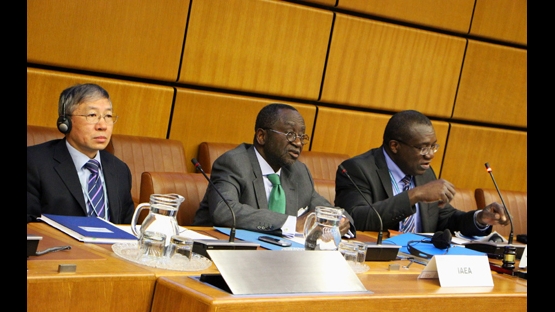From building cities to raising healthy children, every facet of human development relies on the availability of potable water. Yet, despite efforts at every level, UN Water estimates that around 1.2 billion people live in areas of physical water scarcity. Increasingly, water-scarce communities have to compete with agriculture and industry for the use of local water supplies-and they don't always succeed. This dearth of water has many interconnected causes, and the importance of 'joined up' water management is coming evermore to the fore.
In the Sahel, a semi-arid region that runs the width of the African continent, watering holes have sustained nomadic peoples for centuries. Unfortunately, in recent decades, recurrent droughts, overexploitation and demographic change have taken their toll on these limited resources. Through regional cooperation, this impact can be better managed. Together with the concerned Member States, the IAEA is engaged in a technical cooperation (TC) project that is working to ensure the sustainability of groundwater sources throughout the Sahel.
The project, entitled "Integrated and Sustainable Management of Shared Aquifer Systems and Basins of the Sahel Region," was inaugurated in July 2012, and has now been operational for nearly two years. The IAEA hosted its first coordination meeting at its headquarters in Vienna, from 5-8 May 2014. The meeting addressed the priorities of the countries sharing the five aquifer systems of the Sahel, and brought together representatives of all thirteen involved Member States, four Joint Authorities and two partner organizations.
Throughout the four-day meeting, discussions were organized to elaborate each participant's role, and to consider recommendations. Among the many proposals made during the meeting, the creation of a project steering committee was perhaps the most notable. The steering committee could assemble institutional partners, Member States and the Joint Authorities in order to facilitate the implementation of the project. The IAEA will review implementation within each aquifer and in consultation with the counterpart, identify where these proposals would be most appropriate in expediting implementation within the region.
The coordination meeting also provided the opportunity to take stock of the project's achievements: Thus far, an extensive volume of isotopic and hydro-chemical data has been generated. While data-gathering continues, new training courses will focus on capacity building for Geographic Information Systems (GIS), enabling Member States to store and process the hydrological data in their national databases.
Finally, the meeting concluded with the adoption of an updated work plan and a meeting summary, which highlighted commitments and actions to be taken.
The Member States participating in the Sahel project are determined to reverse the ongoing decline of water quality and water availability in the region. To accomplish these goals, the project is focusing on Integrated Water Resources Management (IWRM). This process promotes the development and management of water, but with social welfare and ecosystem sustainability as its guiding principles.
Within the Sahel region, the majority of available fresh water is located in underground aquifers. Because the aquifers' geography, groundwater availability and renewability are all relatively unknown, the IWRM process will apply nuclear techniques, including isotope hydrology, to accurately establish the location, volume and composition of groundwater sources. After all, as the UNESCO representative from the International Groundwater Resources Assessment Centre (IGRAC), explains, "We cannot manage what we do not measure."
With the resulting data, Member States sharing aquifers in the region will be able to develop evidence-based plans to manage and distribute the water among their communities in a sustainable way.
Cooperation, at both the national level and the implementation level, is pivotal to the success of the Sahel project. To that end, the IAEA is working in partnership with a number of institutions, from regional water basin authorities to international institutions such as the Economic Community Of West African States and the African Ministers' Council on Water, to realize its objectives. "We are reducing conflict, ensuring cooperation in sustainable water management, so at the end, the living standards of the people are improved," explains the representative of the Lake Chad Basin Commission.
On the road to achieving more effective water management, the Sahel project will face many logistical challenges, from arsenic contamination to water salinization. But by implementing the recommendations of the Sahel coordination meeting, and by encouraging regional collaboration, the burden and rewards of sustainable water management can be shared amongst the participating Member States. Underscoring this need for cooperation the representative of the Niger Basin Authority noted, "By sharing the work, we can all share the benefits of resource and human development."
Strengthening Cooperation for Integrated Water Resources Management in the Sahel Region
22 May 2014
Related resources
More
Last update: 16 Jul 2018


